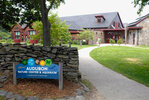Tracing Washington’s Travels, by George!
Rehoboth Ramblings
If you’ve ever wondered how the phrase “George Washington Slept Here” became part of American history, Nathaniel Philbrick has the book for you. This well-regarded writer of popular history books takes a personal approach to Washington’s life and times in his new book “Travels with George: In Search of Washington and His Legacy.” Philbrick says he got the idea for the book from John Steinbeck’s classic, “Travels with Charley” about that author’s mid-20th century trip across the U.S. with his dog Charley, a standard poodle.
In “Travels with George,” Philbrick’s travel companions are his wife Melissa, and Dora, his high-spirited Nova Scotia duck tolling retriever (generally called a toller for short). Nathaniel and Melissa retrace the route of George Washington’s journeys in 1789-1791, as they stop at historic sites and landmarks to learn more.
The Philbricks follow three separate journeys of Washington, starting with the New England tour in the autumn of 1789. This trip did not include Rhode Island because the smallest state had not yet ratified the Constitution. On his next journey in 1790 around Long Island, the first president included Newport and Providence. He came by ship this time. Philbrick notes that sailing up and down the coast was that era’s equivalent of traveling on I-95 today since it was much more efficient than the grueling overland trips of the time.
This part of Philbrick’s adventure, including going to Newport’s Touro Synagogue, which Washington memorably visited, and the John Brown House in Providence, will be of special interest to readers in this part of the country. Last is Washington‘s difficult journey from Philadelphia all the way down to Charleston and Savannah and back up to his beloved Mount Vernon from March to July in 1791.
This book is partly a well-researched analysis of the politics of that time, along with a vivid look at what life was like in those days. It’s also a chatty travelogue about the author’s own (much more comfortable) trip. While Philbrick’s travels are not quite as difficult as his subject’s, in one episode the Philbricks, who are avid sailors, get caught in a violent storm while attempting to sail from their home in Nantucket to Newport.
There is a lot here for readers who want to know more about daily life 230 years ago. It was pretty tough. The average American today enjoys much greater comfort and cleanliness than even the rich and powerful did in centuries past. The description of Washington’s dentures (photo included) and “dentistry” in general at that time will leave you cringing.
Washington had decided that he would stay at public inns rather than at the homes of wealthy friends and supporters (as was usual at that time) on his journeys around the former colonies, to portray himself as a man of the people. And indeed he was given a hero’s welcome at stops along the way. But your average early American roadside inn and tavern in 1790 would make even a humble motel today look like the Four Seasons.
Imagine that you were riding all day on horseback or bouncing around in a carriage on deeply rutted roads. Then late in the day you would pull up to an inn, where it was common for strangers to share a room, or even a bed. And who knew what food would be available? In one place, it was only milk and crackers. It’s a wonder Washington was able to sleep at all on his travels.
Philbrick offers an astute look at the politics of that time and ours. He believes that while Americans have always sharply disagreed about how to govern the country, now “the sinews of this country have been stretched to what feels like the breaking point.”
Washington was a man of his times in that he was an owner of many slaves, typical of a wealthy Southerner then. Philbrick does not shy away from this side of the story, including a disturbing section about his relentless pursuit of Ona Judge, a young female runaway slave from Mount Vernon. Yet he, and the other founding fathers, were far ahead of their time in other ways. In spite of their ongoing differences on governance, they established their new nation as a democracy in an age of absolute monarchs.
Washington, perhaps more than most, was a man of contradictions. Not especially charismatic, he was nevertheless a great general and leader. “Travels with George” will give readers a real insight into this complex man and his place in history.

















Comments
No comments on this item Please log in to comment by clicking here